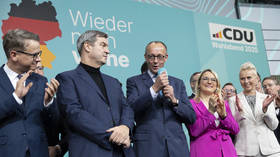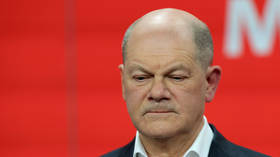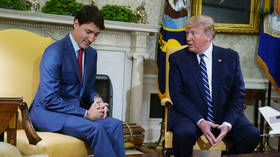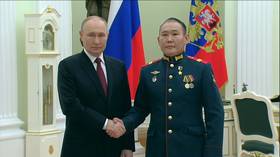'Peace in Ukraine is bad for business in the West'
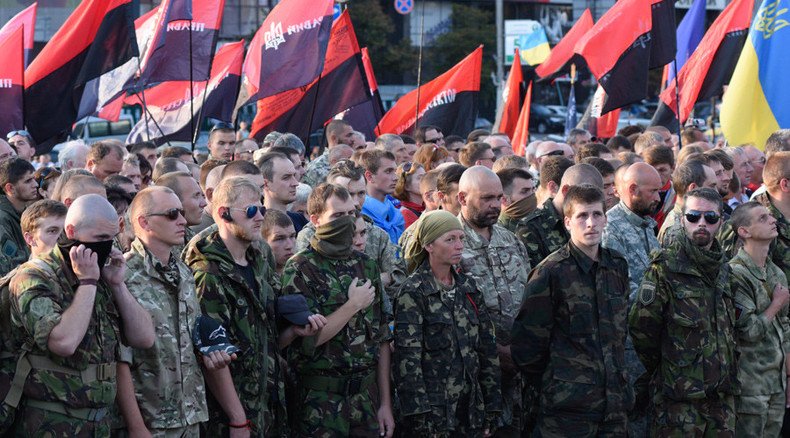
When there is peace in Ukraine there is no point to have NATO involved militarily in Ukraine, so there is no motivation to keep peace in the country as it threatens Western military business, geopolitical analyst Patrick Henningsen told RT.
Supporters of the Ukrainian nationalist Right Sector movement gathered in the center of Kiev on Tuesday. They called on Kiev authorities to resign.
RT: Does the Right Sector pose a serious threat to the current government of Petro Poroshenko?
Patrick Henningsen: I would say yes. One year ago I said on air that this government would eventually be deposed by the same fascist mob that put them into power in February 2014. And now we can see Maidan 2.0 – is what I referred to it last year - that is starting to take shape now. What I see is a very long and protracted political and social destabilization going on in Ukraine. This could go well through winter and into next spring.
RT: Do you see these extremists getting wider popular support across Ukraine?
PH: Yes, it only stands to reason, because Ukraine was an economic basket case before the regime change effort was put into motion by the US and the EU back in the November 2013. That’s when the Right Sector was formed ‘coincidently.’ Of course that was no coincidence the Rights Sector was formed at time.
So this sort of destabilization is going to play into the discontent of the public. And the mob brought this government into power. You have to remember, this is an illegal government, it is unconstitutional. Today the mob took the previous government out, threw them into the streets, and then they held elections last June. But those elections were not constitutional. So you still have technically an illegal government. People are very unhappy.
President Poroshenko had two choices. When you become leader of the country, regardless who your sponsor is, who puts you into power, you have to bring the country together or watch it be torn apart. I believe he is trying to put the country together regardless how he came in. And the US is not happy; he is almost not fascist enough for Washington, or for the people who are sponsoring him. That’s what I see the mob will play against the President right now.
READ MORE: Thousands of Ukraine ultranationalists gather on Maidan, announce ‘new revolution’
RT: Poroshenko promised to get rid of all the radical elements in Ukraine. Why is it proving to be so difficult?
PH: First and foremost is the hypocrisy of the government itself, which is involved in the practice of lustration. Their opposition candidates are being marginalized; opposition journalists being murdered; a ban on certain types of reporting regarding what is going on in the east. Also, not talking to the opposition. There is a constitutional amendment that was supposed to go before the Supreme Court this week which basically leaves Lugansk and Donetsk Republics completely out of the conversation. So from the beginning, Kiev was not talking to the opposition, and that is what they’ve continued to do, and it’s only going to increase divisions in the long-term throughout the country.
RT: Earlier today, the US ambassador to Ukraine said that “the use of force is the exclusive prerogative of the Ukrainian government.” Yet when President Yanukovich was in power, Washington said that the government must listen to its people. Why do you think there is a U-turn?
PH: It is a kind of the unique situation you have in the east of Ukraine. The Right Sector, or sort of paramilitary arm of the Right Sector, if you will, is allowed to roam as a kind of a free radical. This gives Kiev deniability in terms of breaking the ceasefire. And the ceasefire has been broken many times, it is almost a daily occurrence… this is a kind of get out card for Kiev, so they can have deniability, or the Right Sector is a loose cannon.
Washington loves this as well because it leaves a destabilized situation in place. The minute there is peace in Ukraine, the minute the East and the West can come together, then there is no point to have NATO involved militarily wanting to arm the Ukrainian military or any involvement from the NATO factions within Ukraine - it’s over. So there can’t be peace as far as NATO is concerned, then there is no motivation, and there is no threat level with regards to Russia, etc. Peace is not good for business for the West in this case.
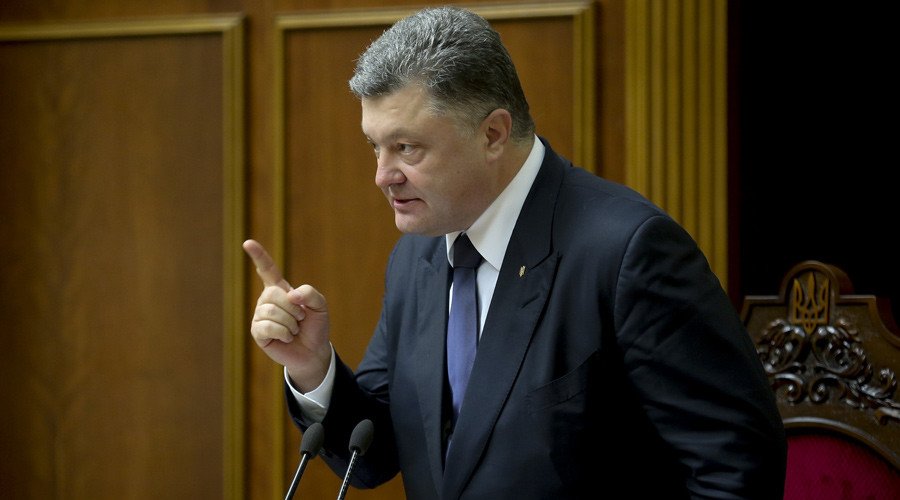
Poroshenko: symbiosis with Right Sector
RT: Have the tables turned on Poroshenko's government with the Right Sector radicals occupying Maidan square against his government?
Daniel McAdams: I don’t think so. It may sound strange, but I think there is a kind of a symbiosis that is going on here. It will help Poroshenko’s reputation in the West if he acts against the Right Sector. And the Right Sector pushing him to the right will also embolden him to make moves in the East. In a sense they need each other. I think it is very significant that just before this event [yesterday], just a week ago, Victoria Nuland, who is the architect of the coup in Ukraine, was in Kiev, was talking to Ukrainian authorities. I cannot believe that the incidences, the one in Transkarpatia [Zakarpattia Oblast] and the continuing unrest was not a significant part of the conversation. So the US is very aware of what’s going on.
RT: The Right Sector nationalists say they now don't trust Ukraine's government since it's not living up to what the people want. What is it the Right Sector radicals want?
DM: I do not know what they want. The question is what kind of a threat do they pose to the government and what is the US response. It is very telling that both Geoffrey Pyatt today, and Victoria Nuland and the State Department spokesman last week all three of them said: “Hey, this is an internal matter for the Ukrainians to solve, with Right Sector. However, how they chose to solve it its fine with us.” And I think that is a very important and very different message than we heard just over a year ago.
RT:The ambassador Geoffrey Pyatt, who you mentioned, says that “the use of force is the exclusive prerogative of the Ukrainian government.” It is a huge change in rhetoric, isn’t it, from what we were hearing 18 months ago or so?
DM: I think anyone holding their breath for US foreign policy to be consistent will die very quickly, because the US foreign policy is best defined by situational ethics. If you’re an ally of the US you can get away with murder, literally. If it’s time for you to go, if Victoria Nuland believes it’s time for you to go, then there is nothing you can do, there is no amount of restraint. And we did see a lot of restraint on the part of the previous government that will stop you.
RT: Is there popular support out there for the Right Sector? Could that be a real threat for Poroshenko?
DM: Of course, there is a strong support. These people were needed, they were useful before. I think it’s very important that they are causing problems on the western border of Ukraine. I think this could be the next flash point. Hungary is very nervous, so is the government of Slovakia. Hungary has even talked about providing asylum for some hundred thousand ethnic Hungarians that are living in Ukraine, which was once part of historic Hungary. So you have the potential for EU countries to get involved. They’ve been hung out to dry by Brussels, their concerns have been ignored; this could be the next flashpoint.
The statements, views and opinions expressed in this column are solely those of the author and do not necessarily represent those of RT.
The statements, views and opinions expressed in this column are solely those of the author and do not necessarily represent those of RT.



